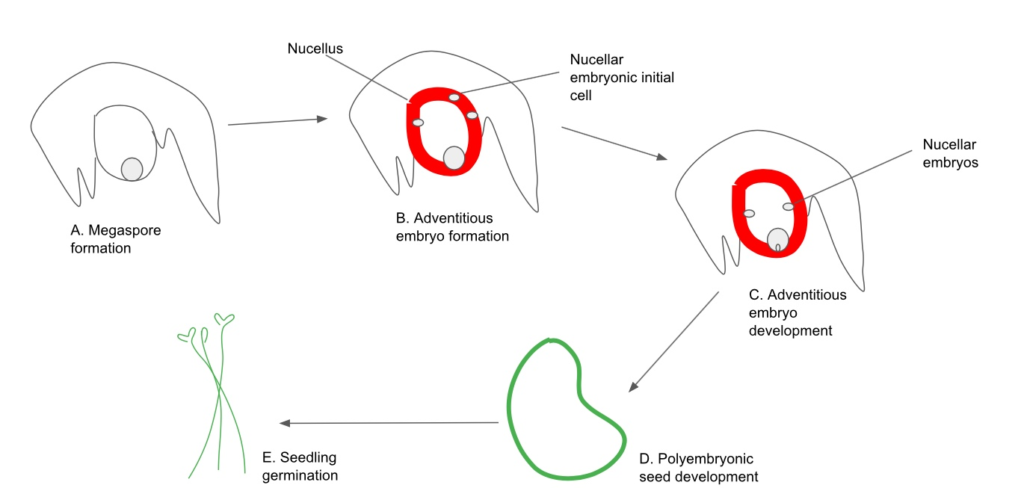Nucellar polyembryony is a fascinating phenomenon in plant reproduction where multiple embryos develop from a single seed. This process occurs in certain plant species and has significant implications for agriculture, plant breeding, and seed production. It plays a crucial role in maintaining genetic uniformity and improving crop yield. But what exactly is nucellar polyembryony, and why does it matter? In this article, we will explore this topic in detail, covering how it works, its benefits, and its impact on farming.
What Is Nucellar Polyembryony?
Nucellar polyembryony is a type of asexual reproduction in plants where multiple embryos form within a single seed. Unlike sexual reproduction, which involves fertilization and genetic variation, nucellar polyembryony occurs when embryos develop from nucellar cells, which are part of the maternal tissue in the ovule. This means that all embryos produced through this process are genetically identical to the parent plant.
This phenomenon is commonly found in certain fruit trees and other plant species. It allows plants to reproduce clones of themselves, ensuring that desirable traits are passed down without genetic variation. This has significant implications for agriculture, particularly for crops where uniformity is important for production and commercial viability.
Which Plants Show Nucellar Polyembryony?
Nucellar polyembryony is observed in several plant species, particularly in members of the Rutaceae and Anacardiaceae families. Some well-known plants that exhibit this phenomenon include:
- Citrus species (oranges, lemons, grapefruits, mandarins)
- Mango (Mangifera indica)
- Jamun (Syzygium cumini)
- Mahua (Madhuca indica)
- Amla (Phyllanthus emblica)
- Some varieties of orchids and pines
In these plants, seeds often contain multiple embryos, leading to the development of genetically identical seedlings. This is particularly beneficial for commercial fruit cultivation, where maintaining consistent fruit quality is essential.
Why Do Some Plants Have More Than One Embryo?
Plants have evolved different reproductive strategies to increase their chances of survival and propagation. Nucellar polyembryony provides several advantages, including:

- Ensuring survival – If one embryo fails to develop, others can take its place.
- Maintaining genetic purity – Offspring are nucellar polyembryony is reported in species of to the parent plant, ensuring desired traits remain intact.
- Enhancing propagation – More seedlings can be produced from a single seed, increasing efficiency in plant breeding.
Does This Happen in All Plants?
No, nucellar polyembryony is not a universal trait in plants. It is primarily found in certain species, especially those in the citrus and mango families. Most other plants rely on sexual reproduction, where genetic variation occurs due to the combination of genetic material from two parent plants.
Is This Good for Farmers?
Yes, farmers benefit from nucellar polyembryony because it allows them to grow plants with uniform traits. For example, citrus farmers prefer seeds with multiple embryos because they produce genetically identical trees, ensuring consistent fruit quality and yield. However, it also limits genetic diversity, which can be a disadvantage in terms of disease resistance.
Can We Use This in Farming?
Yes, many agricultural practices take advantage of nucellar polyembryony. It is commonly used in commercial fruit tree propagation, allowing farmers to maintain high-quality orchards without worrying about genetic variation. Additionally, plant breeders use this technique to develop disease-resistant and high-yield varieties of crops.
How Does Nucellar Polyembryony Work?
The process of nucellar polyembryony begins in the ovule of the plant. Instead of forming a single embryo through fertilization, additional embryos arise from the nucellar tissue. These extra embryos are genetically identical to the parent plant because they develop from somatic (non-reproductive) cells rather than through sexual reproduction.
This can happen in different ways:
- Spontaneous development – Some plants naturally produce multiple embryos without external triggers.
- Induced polyembryony – Certain environmental or genetic factors can increase the occurrence of multiple embryos.
- Hybridization influence – Some hybrid plants tend to show a higher frequency of nucellar polyembryony.
Once the seed germinates, multiple seedlings may emerge. The strongest embryo usually outcompetes the others, but sometimes multiple seedlings can grow simultaneously if conditions allow.
Benefits of Nucellar Polyembryony
Nucellar polyembryony offers several advantages, making it valuable for plant propagation and agriculture. Some key benefits include:
- Genetic uniformity – All offspring are clones of the parent plant, ensuring consistent traits.
- Higher survival rates – Multiple embryos increase the chances of successful germination.
- Reliable crop production – Farmers can predict yield and fruit quality more accurately.
- Resistance to environmental stress – Clonal reproduction helps maintain strong genetic lines.
- Cost-effective propagation – Farmers can grow multiple identical plants without needing to rely on grafting or cuttings.
Does Nucellar Polyembryony Affect Seed Quality?
Nucellar polyembryony generally does not negatively impact seed quality. In fact, it often improves the reliability of seed production by ensuring that new plants inherit desirable traits from the parent plant. However, there are some potential concerns.

Do Farmers Prefer These Seeds?
Yes, many farmers and commercial growers prefer seeds from plants that exhibit nucellar polyembryony because they guarantee uniformity and high-quality crops. This is especially important in citrus and mango production, where fruit consistency is essential for market value.
Are There Any Disadvantages?
While nucellar polyembryony has many benefits, there are some drawbacks, including:
- Limited genetic diversity – Because all offspring are clones, they may be more susceptible to diseases and environmental changes.
- Reduced adaptability – Plants with identical genetics might struggle to adapt to new environmental conditions.
- Competition among embryos – Sometimes, weaker embryos may not survive, leading to resource competition.
Benefits of Nucellar Polyembryony
Despite some disadvantages, the benefits often outweigh the risks, especially for commercial farming. Farmers can produce high-quality crops with predictable traits, leading to better economic returns.
Thoughts: Why Is This Important?
Understanding nucellar polyembryony is crucial for both farmers and plant scientists. This natural phenomenon helps improve plant breeding, ensures consistent crop production, and supports agricultural sustainability. As the demand for high-quality food continues to rise, using techniques like nucellar polyembryony can help maintain food security while reducing dependence on traditional seed propagation methods.
The Bottom Line
Nucellar polyembryony is a unique form of asexual reproduction in plants that allows multiple embryos to develop from a single seed. This process is highly beneficial in commercial agriculture, particularly for crops like citrus and mangoes. By producing genetically identical plants, farmers can ensure uniform fruit quality, high yield, and predictable crop performance. While there are some drawbacks, such as limited genetic diversity, the advantages of nucellar polyembryony make it a valuable tool in modern farming. Understanding and utilizing this natural process can lead to more efficient and sustainable agricultural practices, ultimately benefiting both farmers and consumers.

